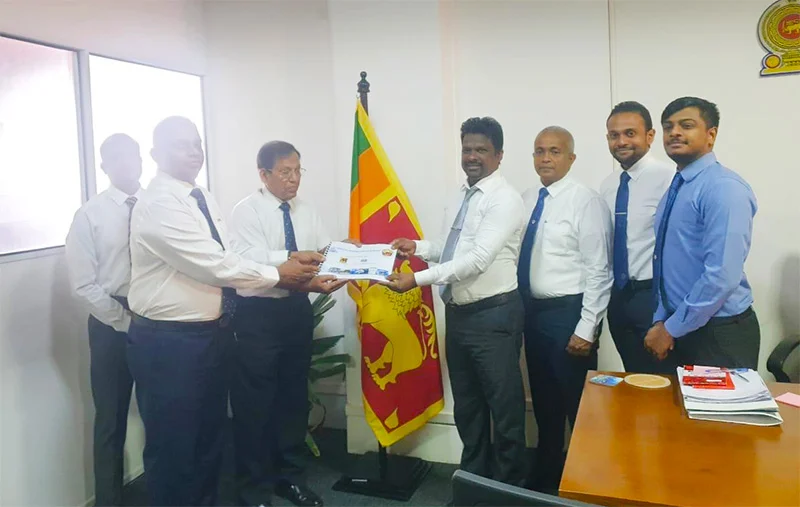Business
Kanrich Finance to merge with Nation Lanka Finance and increase capital base to over Rs. 3 billion

By Hiran H.Senewiratne
Kanrich Finance Ltd (KFL) will merge with Nation Lanka Finance PLC (NFL) and will increase their capital funds to over Rs. 3 billion, chairman/Director KFL Ravi Ratnayake said.
“This is being done under the Master Plan for Consolidation of Non-Bank Financial Institutions, evolved by the Central bank, and we have received the approval for this merger, which is aimed at meeting the deficit of the Capital Adequacy requirements of Rs. 2.5 billion, Ratnayake told The Island Financial Review.
Ratnayake added: “As per directions of the CBSL, Kanrich Finance has already started to settle the public liabilities of their customers in full and this process will be completed before the end of February 2023. The company settles these liabilities as part of the regulations for the merger and we have adequate funds to settle all deposits and promissory notes.
“Kanrich depositors, after they receive their deposits, are welcome to join the newly merged entity. There is another advantage to them as they can benefit from the increasing deposit rates in the market. In addition, our staff can provide advice if needed on re-investing.
“The Central Bank plans to reduce the number of finance companies from 42 to 25. One condition of their plan is that the companies which cannot show a capital of Rs. 2.5 billion must merge with another company or become a non-licensed company. Though Kanrich fulfilled all other requirements, Kanrich is missing this threshold marginally. Therefore, Kanrich has to fill this capital gap or become a non-licensed company. Accordingly, Kanrich is in the process of finalizing a merger with another finance company.
Kanrich Finance is performing well and continues to make profits, recording high financial stability. Despite the C-19 and regulatory restrictions, we recorded Rs. 183 million in profits before tax and Rs. 113 million after-tax profits last year. Kanrich is also reaching Rs. 2 billion in capital and possesses an impressive capital adequacy ratio of 29%.
“Prior to this in 2019, Kanrich had a tough time and to overcome this they implemented institutional restructuring, cost reduction and increased efficiency and productivity which resulted in a positive turn around resulting in reducing overhead costs. Senior management even voluntarily agreed to cut their salaries and allowances.
“With regard to Micro Finance Business, the product of Kanrich is entirely different from what is available in the market as it is based on a sustainable financing concept.
“However we opted out of such loans mainly due to political interventions in the microfinance industry. Political leadership publicly declared in 2019 that they would write off rural masses’ micro-loans, resulting in the accumulation of extensive NPL portfolios by financial institutions, including Kanrich. The extensive NPL portfolio in the micro product area resulted in weak income statements and tight liquidities.
“The company was subject to severe lending and deposit restrictions by the regulatory authority.
“Kanrich will not exit from the finance business as it is not a failed or collapsed company and does not have any other financial problems as well.
“On the contrary, it is doing well in terms of all financial indicators and after the merger will continue to engage in finance as an even stronger merged entity.
“On the subject of the Central Bank going ahead with the consolidation of finance companies and undertaking reforms in the finance sector, we have a doubt about the timing of these financial reforms.
“President Ranil Wickremesinghe recently said that he does not want to implement any reforms because they cannot be undertaken in a crisis situation.
“Unfortunately, the economic crisis is still unfolding and it has an enormous adverse impact on the business sector, including finance. Therefore, I believe that the government could consider giving the distressed companies some time to recover before subjecting any reforms.
“With the amalgamation with Nation Lanka we will become stronger and as a standalone lending institution will provide a better service to customers.”
Business
Foreign Minister defends India pacts, sidesteps transparency demand

In a press conference marked by both clarity and pointed omission, Foreign Affairs and Tourism Minister Vijitha Herath, yesterday offered a robust defence of two controversial bilateral agreements with India but conspicuously avoided committing to tabling their full texts in Parliament.
The minister’s appearance, billed as a year-opening briefing, took a sharp turn when questioned on the strategic implications of the India-Sri Lanka Defence Cooperation Agreement and Sri Lanka’s acceptance of the Indian Pharmacopoeia.
“No Indian military camps on our soil”
Responding in Sinhala to a question posed in English, Minister Herath moved first to allay what he suggested were widespread misapprehensions about the defence pact.
“This agreement is especially for data and information exchange purposes regarding drug trafficking, drug mafias, human trafficking, and any terrorist activities that could threaten regional security and peace,” Herath stated.
He emphasised that it would also facilitate “various support related to the defence sector.”
In his most definitive assertion, aimed at quieting a persistent national anxiety, the Minister declared: “We must clearly say that there is no plan or possibility of setting up Indian defence camps on Sri Lankan soil.” He categorised the pact not as a “defence agreement” but a “defence cooperation agreement in its real sense,” claiming it creates an “advantageous position” for Sri Lanka.
He linked recent post-‘Ditwah’ cyclone disaster support from India, as well as U.S. aerial support during recovery efforts, to the frameworks established by such cooperation agreements, arguing they have proven beneficial.
Indian Pharmacopoeia: A reputation-based advantage
On the equally contentious acceptance of the Indian Pharmacopoeia – a standard synopsis for drug manufacturing – Minister Herath framed it as a logical step that formalises existing practice.
“We already import a significant share of medicines from India,” he noted. The agreement, he explained, signifies the acceptance of medicines exported by a “reputed Indian pharmaceutical company” approved by its national regulators.
He assured the public that Sri Lanka’s National Medicine Regulatory Authority (NMRA) will continue to remain the monitor. “By entering into this, no disadvantage will happen to us. Only an advantage will happen… it will only be beneficial to us,” he emphasised.
The unanswered question
Despite the detailed assurances, the Minister pointedly ignored the final and arguably most critical part of the question posed by The Island Financial Review : whether the government would table the full text of the two agreements in Parliament for transparent debate and discussion.
This omission is likely to fuel further controversy, as opposition parties, civil society groups, and independent analysts have repeatedly demanded full parliamentary scrutiny, arguing that agreements touching on sovereignty and public health mandate the highest level of public transparency.
Tourism Pride
Shifting to his tourism portfolio, Minister Herath struck an optimistic note, citing record tourist arrivals and foreign remittances in 2025 as a sign of resilient recovery post-Ditwah.
The conference also touched on global affairs. When asked about the U.S. arrest of Venezuelan President Nicolás Maduro, Herath presented a nuanced governmental position. He stated that while his party, the JVP, condemns the action, the government’s official stance is to urge respect for national sovereignty in line with the UN Charter – a reflection of the coalition’s delicate balancing act between ideological roots and diplomatic pragmatism once in governance.
Minister Herath’s explanations provide the government’s clearest public rationale yet for the India agreements, directly confronting fears over militarisation and pharmaceutical quality. However, the deliberate sidestepping of the transparency query left a communication deficit at the heart of the press conference.
High-stakes diplomacy
It reflected a perception that while the administration is willing to defend its policy outcomes, it remains reluctant to subject the processes of high-stakes diplomacy to the full glare of parliamentary and public scrutiny. As these agreements continue to shape Sri Lanka’s strategic and health landscape, the call for their full disclosure is now accompanied by a louder question about the government’s commitment to open governance.
by Sanath Nanayakkare
Business
‘Vehicle-Testing Can Save Lives’

Automobile Association of Ceylon (AAC), in collaboration with the Federation Internationale de L’ Automobile (FIA) and under the UN Decade of Action for Road Safety has been consistently engaging in road safety enhancement programs for all citizens of Sri Lanka.
Current data indicates that while over 08 million vehicles are registered in the country, only heavy vehicles (less than 20% of the vehicle population) are subjected to compulsory road-worthiness tests.
Fatal accidents due to technical failures in vehicles are on the rise and the damage to lives and property is severe.
We also understand that there is a death every three hours and eight deaths per day in road accidents. This amounts to nearly 3000 deaths in road accidents per year.
AA of Ceylon has launched the “Vehicle Testing can Save Lives” project with the advice and support given to execute our campaign by the Minister of Transport, chairman, National Council for Road Safety (NCRC), Deputy Inspector General of Police (Traffic Division), Dr. Indika Jagoda, Deputy Director (Accident Service), National Hospital, president, Lions Club of Boralasgamuwa, Metro(Lions Club International – District 306 D 2) and other stake-holders to find a workable, low / cost solution for mandatory vehicle testing in Sri Lanka.
Therefore, this project aims to educate the public on the necessity of checking essential safety features in all vehicles and the benefits of same to all road users.
AAC has therefore respectfully requested Anura Kumara Dissanayake, President of the Democratic Socialist Republic of Sri Lanka, to consider implementing the proposal we have submitted to him, to minimize fatal accidents, injuries to people and damage to vehicles and property due to road accidents and to also implement a rule to have compulsorily road-worthiness checking of all vehicles. (AAC)
Business
INSEE Lanka appoints new Chief Executive Officer

Siam City Cement (Lanka) Limited (INSEE Lanka) has announced the appointment of Eng. Thusith C. Gunawarnasuriya as its new Chief Executive Officer, effective 01 January 2026. He succeeds Nandana Ekanayake, who will continue to serve as Chairman, ensuring leadership continuity and strategic stability for the organisation.
A long-standing contributor to INSEE’s journey, Thusith has worked with the company through its evolution under Holcim (Lanka) Ltd, LafargeHolcim and INSEE, playing pivotal roles that influenced both operational progress and strategic direction.
Rejoining INSEE Lanka in January 2025 as Chief Operating Officer, he has since demonstrated exceptional leadership, driving topline growth, improving EBITDA performance, and strengthening talent development initiatives that enhanced organisational capability and business outcomes.
His expertise in business strategy, operations excellence, and supply chain transformation is well-recognised, supported by over 25 years of multi-industry and multi-country leadership experience. His career includes senior positions at Lion Brewery (Ceylon) PLC, Hemas Manufacturing, Fonterra Brands Lanka, GlaxoSmithKline, MAS Active, and DMS Software Engineering. His international exposure spans India, Bangladesh, and Thailand.
Thusith is a proud alumnus of Dharmaraja College, Kandy, and holds a BSc (Hons) in Electrical & Electronic Engineering from the University of Peradeniya, an MBA from the University of Colombo, and an MSc in Business & Organizational Psychology from Coventry University, UK. He has completed executive leadership programs at IMD (Switzerland) and the National University of Singapore. He is also a member of IEEE (US), CILT (UK), ISMM (Sri Lanka), and IESL (Sri Lanka).
Chairman’s Quote – Nandana Ekanayake:
“Thusith’s deep understanding of our business, strong operational mindset, and proven leadership make him the ideal successor to lead INSEE Lanka into the next phase of growth. His experience within INSEE and across multiple industries, positions him well to deliver on our long-term ambitions and uphold the values that define the organisation.”
-

 News1 day ago
News1 day agoPrivate airline crew member nabbed with contraband gold
-

 News10 hours ago
News10 hours agoBroad support emerges for Faiszer’s sweeping proposals on long- delayed divorce and personal law reforms
-

 News3 days ago
News3 days agoHealth Minister sends letter of demand for one billion rupees in damages
-

 Opinion5 days ago
Opinion5 days agoRemembering Douglas Devananda on New Year’s Day 2026
-

 News6 days ago
News6 days agoLeading the Nation’s Connectivity Recovery Amid Unprecedented Challenges
-

 Features1 day ago
Features1 day agoPharmaceuticals, deaths, and work ethics
-

 Latest News1 day ago
Latest News1 day agoCurran, bowlers lead Desert Vipers to maiden ILT20 title
-

 News1 day ago
News1 day agoPM lays foundation stone for seven-storey Sadaham Mandiraya











